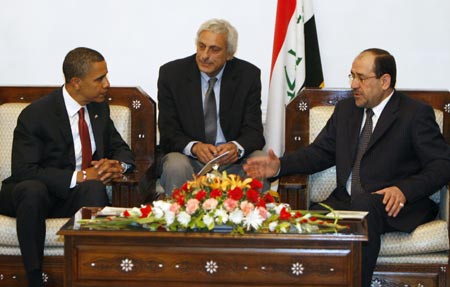 Iraq's President Jalal Talabani (R) meets with U.S. Democratic presidential candidate Barack Obama (L) in Baghdad July 21, 2008. (Xinhua/Reuters Photo)
Iraq's President Jalal Talabani (R) meets with U.S. Democratic presidential candidate Barack Obama (L) in Baghdad July 21, 2008. (Xinhua/Reuters Photo)
Abdullah warned that the Israeli settlement policy and its imposition of new realities on the ground, along with the siege on the Palestinian people would exacerbate conflict and undermine peace efforts.
Obama kicked off the week-long tour last Thursday with an aim to establish his credentials in foreign policy and national security where the Republican presidential candidate McCain gains upper hand over him.
Obama arrived at Afghan capital Kabul on Saturday as part of a Congressional fact-finding mission, along with two other senate fellows, Democrat Jack Reed and Republican Chuck Hagel.
During his stay in Afghanistan, Obama pledged to pour long-term support to the war-torn country when meeting with Afghan President Hamid Karzai on Sunday. The talks also covered issues of security situation, regional stability, drug fighting, war on terror and bilateral relations. On Monday morning, Obama arrived in Iraq, where he welcomed the security gains achieved by Baghdad in battling al-Qaida and Shiite militias in his talks with Iraqi President Jalal Talabani.
In a seeming endorsement of Obama's pullout timetable, Iraqi government spokesman Ali al-Dabbagh said after Obama's meeting with Iraqi Prime Minister Nouri al-Maliki that Iraq hopes the U.S. troops would end its combat role and pull out by 2010, a clear timeline after the vague "time horizon" the two countries just agreed on.
 Iraq's Prime Minister Nuri al-Maliki (R) speaks with U.S. Democratic presidential candidate Barack Obama (L) in Baghdad July 21, 2008. (Xinhua/Reuters Photo)
Iraq's Prime Minister Nuri al-Maliki (R) speaks with U.S. Democratic presidential candidate Barack Obama (L) in Baghdad July 21, 2008. (Xinhua/Reuters Photo)
The Maliki-led Iraqi government is currently in a tug of war with the White House over rules governing the U.S. military presence in Iraq after the UN mandate expires at the end of the year. It has been reported that Maliki sought to take the advantage of U.S. presidential campaign to squeeze Bush administration for the best deal possible.